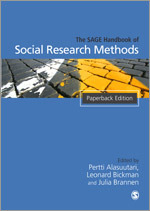The SAGE Handbook of Social Research Methods
- Pertti Alasuutari - University of Tampere, Finland
- Leonard Bickman - Vanderbilt University, USA and Florida International University, USA
- Julia Brannen - Insitute of Education, University of London
The Handbook includes chapters on each phase of the research process: research design, methods of data collection, and the processes of analyzing and interpreting data. The volume maintains that there is much more to research than learning skills and techniques; methodology involves the fit between theory, research questions research design and analysis. The book also includes several chapters that describe historical and current directions in social research, debating crucial subjects such as qualitative versus quantitative paradigms, how to judge the credibility of types of research, and the increasingly topical issue of research ethics.
The Handbook serves as an invaluable resource for approaching research with an open mind. This volume maps the field of social research methods using an approach that will prove valuable for both students and researchers.
I would highly recommend this book as it is easy to understand and covers all the main issues of social research.
Great resource book for introductory research methods. Students really like the chapters.
This text is a valuable reference for social science research. The section on analysis and interpretation of evidence is particularly valuable as it affords opportunities for students to consider how they might want to organise their research design differently in order to draw upon a wider range of analysis methods, that are often less represented in other texts.
This is an excellent text used to navigate students through the research process required for their ethical proposal and dissertation.
Excellent book that is a vital component of any social research methods class. Covers a wide array of research topics in an accessible format.
Comprehensive text. Particularly interesting was the chapter on paradigms. Not as practical as expected, however, content is good.
This is an easy to read to text and I have adopted this as one of the key essential texts for this unit.
Interesting mid-level discussion of research methods; includes examples from my field (education) but they are situated within the larger context of social science research. Thanks for this one!
Give a great all round review of all aspects of social science, and despite its focus on sociology it appears generally applicable to other aspects of social sciences.
Under the current course design, this book, whilst an excellent text, is a step too far too soon for the students and can act only as a terciary reading text... which, if I am being honest, means it will be barely looked at. Consequently, whilst included in the reading list I cannot see it being used by anyone but me. The module is undr review though (for expansion) and it may take on greater promenance in the wider design.





